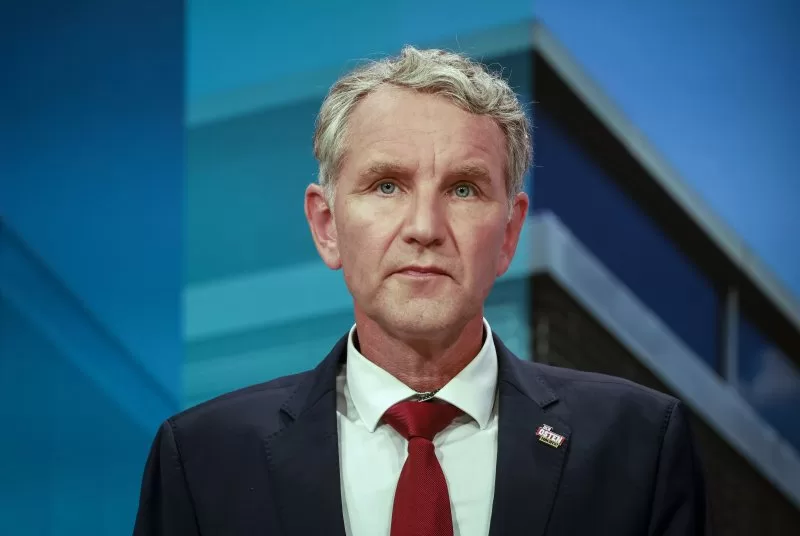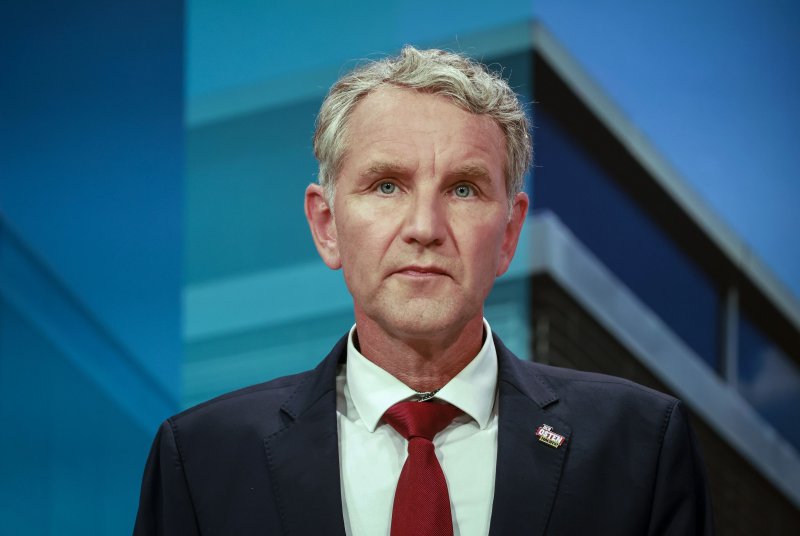Björn Höcke, the far-right AfD party chair for Thuringia, attends a TV debate at the regional parliament of Thuringia in Erfurt, Germany, On Sunday when voting began. He is projected to be the state’s new premier. Photo by Clemens Bilan/EPA-EFE
Sept. 2 (UPI) — Germans in the two states of Thuringia and Saxony voted in regional elections on the weekend, with exit polls showing Monday that a far-right political party has secured its first election victory in the country since World War II.
Voters in the two states headed to the polls on Sunday.
In the central German state of Thuringia, the anti-immigration, far-right Alternative für Deutschland — or Alternative for Germany in English — had secured the most votes at 32.8%, according to German public-service television broadcaster ZDF.
In second was the traditionally conservative Christian Democratic Union, which was once led by former Chancellor Angela Merkel. It had secured 23.6% of the vote.
In third was the newly founded leftist Bündis Sahra Wagenknecht — or the Sahra Wagenknecht Alliance — which won 15.8%.
The victory for AfD is the first by a far-right political party since Nazis ruled the country.
The AfD also finished a close second in the race for the eastern Saxony state that neighbors Thuringia.
The state broadcaster reported AfD had 30.6% of the vote in Saxony, just a hair behind the CDU that had nearly 32%. Again in third was BSW with 11.8%.
Meanwhile, the results deal an embarrassing defeat to the ruling center-left Social Democratic Party of Germany.
The party of Chancellor Olaf Scholz finished fourth in both contests, securing 6.1% of the vote in Thüringia and 7.3% in Saxony.
The results, which come ahead of next year’s general elections, are being seen as a barometer for Scholz’s coalition government.
Tino Chrupalla, a co-leader of AfD, congratulated Björn Höcke, chair of the party in Thuringia, and Jörg Urban, who leads the party in Saxony, for securing more than 30% in their respective elections.
“We want to take responsibility in order to bring about a change for the better!” Chrupalla said on X.
Alice Weidel, the other half of AfD’s top leadership, described the early results as “a hug success” for their party.
The AfD was founded in 2013, and the election results position Höcke to be the party’s first state premier.
“This fills me with so, so much pride and satisfaction,” he told supporters in the Thuringia state capital of Erfurt, state state-owned broadcaster DW reported.
“We are ready to take government responsibility.”
Höcke is a controversial figure, who has been accused of supporting Nazi ideology, has been fined twice for using Nazi-era phrases during his campaign and had participated in a neo-Nazi march in 2010.
Nazi Germany of 1933 to 1945 oversaw the murder of more than 6 million Jews and initiated World War II. Images and slogans associated with the party are now banned in the country.
The AfD’s policy calls for encouraging larger families to deal with Germany’s declining birthrate, while calling for a “paradigm shift” to the country’s immigration system.

